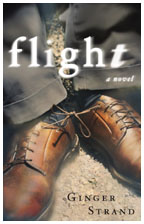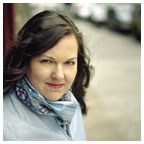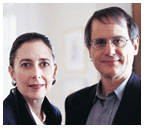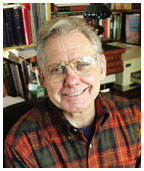Have an opinion about this issue of PAW? Please take a minute to click here and fill out our online questionnaire. It’s an easy way to let the editors know what you like and dislike, and how you think PAW might do better. (All responses will be anonymous.) |
May 11, 2005: Reading Room
Seeking
flight
The characters in Ginger Strand *92’s novel
can’t resist the urge to move forward
One of the main characters in Ginger Strand *92’s novel is based on her father. (courtesy Ginger Strand *92) |
After earning a Ph.D. in English literature at Princeton, Ginger Strand *92 wrote a scholarly essay on the construction of party loyalties in early American theater — which sounds pretty dry, she admits. But the reviewer of the book in which her essay appeared said her piece “read like a short story.” That comment revealed the young scholar’s yearning.
“I loved teaching. And I enjoyed many things about the research, but my heart wasn’t in it,” says Strand. “I really wanted to be writing stories.” So after completing two postdoctoral fellowships, Strand left academia, took a job as a copywriter at a friend’s corporate consulting firm, and started taking night classes in fiction. Before long she began publishing short stories.
For Strand, seeds for her fiction are everywhere, including in the random interactions she observes among strangers in her Manhattan neighborhood. “Writers tend to see the world as crammed with potential stories,” says Strand, whose first novel, Flight, was published this month by Simon & Schuster.
 The idea
for Strand’s novel didn’t begin with any one observation,
however, but by observing her father, a former TWA pilot, and changes
in American culture over the last 30 years as reflected in the airline
industry. One of the novel’s main characters, Will, is loosely based
on Strand’s father. “After Sept. 11, I began to see his career
— from the glamorous ... days of the 1960s through deregulation
and into the brave new world order of homeland security and nail-file
confiscations — as representative of an era of sweeping change in
the way we think and live,” says Strand.
The idea
for Strand’s novel didn’t begin with any one observation,
however, but by observing her father, a former TWA pilot, and changes
in American culture over the last 30 years as reflected in the airline
industry. One of the novel’s main characters, Will, is loosely based
on Strand’s father. “After Sept. 11, I began to see his career
— from the glamorous ... days of the 1960s through deregulation
and into the brave new world order of homeland security and nail-file
confiscations — as representative of an era of sweeping change in
the way we think and live,” says Strand.
Flight focuses on Will, a 59-year-old commercial airline pilot who reluctantly is anticipating forced retirement at age 60; his discontented wife, Carol, who has sacrificed her dreams to Will’s by moving back to his family’s farm in Michigan; and their two daughters, Margaret, the organized, ambitious one whose marriage to an academic colleague is sputtering, and Leanne, the free spirit who has struggled with commitment and alcohol and isn’t sure whether to go through with her impending wedding.
Woven into the story are Will’s recollections of missions he flew in Vietnam. Although Strand’s father never fought in Vietnam, “the war was like a dark cloud” hanging over her childhood, says Strand.
The novel’s central theme is movement — the human urge to keep moving forward, even as life is messy and uncertain, and the tension between progress, staying still, and moving back into the past.
Today, Strand divides her time between fiction and freelance communications
consulting and copywriting. She says her years in academia continue to
influence her fiction. “Everybody’s own style is a sort of
room with everything they’ve ever read echoing in it,” she
says. And Strand believes that waiting a decade after finishing college
to really get into fiction writing was a good move. “My writing
would have been worse,” she says, “if I had jumped right in
and not lived first.” ![]()
By. K.F.G.
For excerpts from PAW’s interview with Strand, click here.
Alumni win Pulitzer Prizes for history and biography
Annalyn Swan ’73 and Mark Stevens ’73 (knopf)
David Hackett Fischer ’57 (ap/wide world photos) |
Three alumni were awarded Pulitzer Prizes on April 4. Historian David Hackett Fischer ’57, a professor at Brandeis University, won in the history category for Washington’s Crossing (Oxford), and co-authors Mark Stevens ’73 and his wife, Annalyn Swan ’73, won in the biography category for de Kooning: An American Master (Knopf).
Because Pulitzer awards often go to books about statesmen and public figures, says Swan, she was surprised to learn that their book, about an artist, had won. Swan and Stevens, who met at the Daily Princetonian, spent 10 years researching and writing de Kooning, the first full-length biography of the painter Willem de Kooning, who arrived in New York as a stowaway from Holland in 1926 and became one of the most important artists of the 20th century.
Swan, who has been a writer at Time and music critic and senior arts editor for Newsweek, and Stevens, the art critic at New York magazine, tracked down everyone they could find in de Kooning’s life, interviewing hundreds of contemporaries in his artistic and social circles. Says Stevens, “We tried to bring together, as seamlessly as possible, the man, the art, and the cultural history of the times.”
Washington’s Crossing chronicles a major turning point in the American Revolution, when, on Christmas night 1776, George Washington led his troops across the Delaware River to surprise Hessian forces at Trenton. In trying to get a sense of Washington’s experience, Fischer walked the path Washington’s army took, and at Washington Crossing State Park he got in a Durham boat, like those used by the American troops to cross the Delaware. One of Fischer’s models for researching history, he says, is the 19th-century historian Francis Parkman. “His first rule,” says Fischer, “was go there. Do it. So it’s important to get on the ground.”
Fischer, who says he used to think of himself as a historian and professor
but now considers himself a storyteller and teacher, is celebrating by
scribbling away on his next project, a biography of the French explorer
Samuel de Champlain. ![]()
By K.F.G.
BOOK SHORTS
 At the Point of
a Gun: Democratic Dreams and Armed Intervention — DAVID
RIEFF ’78 (Simon & Schuster). The author, a war correspondent,
argues that the use of military force to protect human rights or alleviate
human suffering in the post-Cold War world has largely failed. Rieff is
a contributing writer to the New York Times Magazine.
At the Point of
a Gun: Democratic Dreams and Armed Intervention — DAVID
RIEFF ’78 (Simon & Schuster). The author, a war correspondent,
argues that the use of military force to protect human rights or alleviate
human suffering in the post-Cold War world has largely failed. Rieff is
a contributing writer to the New York Times Magazine.
 Johann Wolfgang
von Goethe, The Man of Fifty — translated and introduced
by ANDREW PIPER ’95 (Hesperus Press). Goethe’s 1829 novella
The Man of Fifty is about the complications, and comedy, of growing
old and falling in love. But as Piper argues in the introduction, it also
is a story intimately concerned with the problems inherent in translation
itself. Piper will begin teaching at McGill University in September.
Johann Wolfgang
von Goethe, The Man of Fifty — translated and introduced
by ANDREW PIPER ’95 (Hesperus Press). Goethe’s 1829 novella
The Man of Fifty is about the complications, and comedy, of growing
old and falling in love. But as Piper argues in the introduction, it also
is a story intimately concerned with the problems inherent in translation
itself. Piper will begin teaching at McGill University in September.
By K.F.G.
For a complete list of books received, click here.



